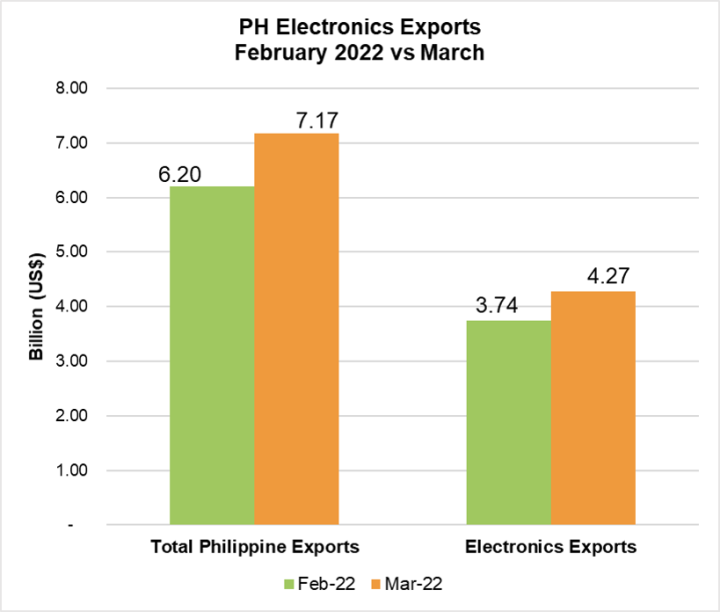During a dialogue with Senator Maria Imelda “Imee” Marcos at the signing of a memorandum of understanding on spreading development to the regions between the Philippine Economic Zone Authority (PEZA) and the Department of Environment and Natural Resources (DENR) last Tuesday, May 31, the Semiconductor and Electronics Industries in the Philippines Foundation Inc. (SEIPI) indicated that up to USD 3.6PHP 211INR 305EUR 3CNY 26 billion worth of potential investments in the electronics industry were set to be committed elsewhere.
SEIPI had attributed this “capital flight” to the current policy trend implemented by the Filipino government.
“There are lots of concerns and what happened is capital flight. We have about five companies already to the tune of USD 3.2PHP 188INR 271EUR 3CNY 23 billion that moved to Vietnam, Thailand, and China, move means instead of investing in the Philippines. And there is another USD 400PHP 23,474INR 33,900EUR 381CNY 2,911 million for a total of 25,000 workers that we may lose,” said SEIPI President Danilo “Dan” Lachica.

Among the reasons cited by SEIPI include the rationalization of fiscal incentives as result of the CREATE Act, the ocular inspections being conducted by the Bureau of Internal Revenue (BIR) and the Bureau of Customs (BOC) on PEZA locators as part of their audit processes, and the “return to office” (RTO) or “back to office” mandate for PEZA-registered enterprises, risking non-compliant firms still implementing work-from-home (WFH) or hybrid schemes to lose their tax incentives.
“FIRB (Fiscal Incentives Review Board) basically has reduced the effectiveness of PEZA,” Lachica added.
For their part, IT & Business Process Association of the Philippines (IBPAP) President and CEO Jack Madrid raised the possibility of FIRB passing a resolution allowing a hybrid model: 70 percent on-site and 30 percent WFH.
Meanwhile, PEZA Director General Charito B. Plaza reported during the meeting that BIR has already suspended its audit of PEZA-registered enterprises, maintaining that they continue to grant letters of authority to allow up to 30 percent WFH, particularly for BPOs.
In relation to the ongoing WFH issue, Management Association of the Philippines (MAP) President and nominee for Department of Trade and Industry (DTI) Secretary Alfredo Pascual expressed in a recent media interview his openness for a hybrid work setup.
“It could be a guideline, but I don’t think we can force application of that to all types of business,” said Pascual in referring to the 70 percent on-site and 30 percent WFH currently allowed by PEZA for firms with letters of authority.
“My position there is we leave it up to the management of the company to decide what’s best for them, and I think they will pick the best decision because their decisions will be anchored on the viability of their business. So it’s something that I don’t think we can regulate. And we should not,” he expounded.
Pascual was earlier named by President-elect Ferdinand “Bongbong” Marcos, Jr. as the next DTI secretary.

SEIPI reported last February that the electronics sector surged by nearly 13 percent on a yearly basis compared to its 2020 values with USD 45.92PHP 2,695INR 3,892EUR 44CNY 334 billion worth in exports as of 2021. The 2021 record was also higher than the pre-pandemic level of USD 43.32PHP 2,542INR 3,671EUR 41CNY 315 billion as of 2019. According to the Philippine Statistics Authority (PSA), electronics remains to be the nation’s top export product group entering into 2022.
Nonetheless, SEIPI cautioned that existing “regulatory roadblocks” might hamper the robust growth of the electronics industry, which they forecast to be another double-digit showing at 10 percent for the entirety of 2022. Their hopes are currently pinned on the next administration to resolve the issues being raised.

YugaTech.com is the largest and longest-running technology site in the Philippines. Originally established in October 2002, the site was transformed into a full-fledged technology platform in 2005.
How to transfer, withdraw money from PayPal to GCash
Prices of Starlink satellite in the Philippines
Install Google GBox to Huawei smartphones
Pag-IBIG MP2 online application
How to check PhilHealth contributions online
How to find your SIM card serial number
Globe, PLDT, Converge, Sky: Unli fiber internet plans compared
10 biggest games in the Google Play Store
LTO periodic medical exam for 10-year licenses
Netflix codes to unlock hidden TV shows, movies
Apple, Asus, Cherry Mobile, Huawei, LG, Nokia, Oppo, Samsung, Sony, Vivo, Xiaomi, Lenovo, Infinix Mobile, Pocophone, Honor, iPhone, OnePlus, Tecno, Realme, HTC, Gionee, Kata, IQ00, Redmi, Razer, CloudFone, Motorola, Panasonic, TCL, Wiko
Best Android smartphones between PHP 20,000 - 25,000
Smartphones under PHP 10,000 in the Philippines
Smartphones under PHP 12K Philippines
Best smartphones for kids under PHP 7,000
Smartphones under PHP 15,000 in the Philippines
Best Android smartphones between PHP 15,000 - 20,000
Smartphones under PHP 20,000 in the Philippines
Most affordable 5G phones in the Philippines under PHP 20K
5G smartphones in the Philippines under PHP 16K
Smartphone pricelist Philippines 2024
Smartphone pricelist Philippines 2023
Smartphone pricelist Philippines 2022
Smartphone pricelist Philippines 2021
Smartphone pricelist Philippines 2020
troy says:
very colored article.
troy says:
Very colored article